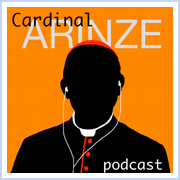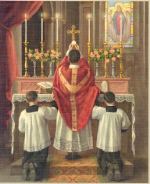Alter Christus - Fulget Crucis Mysterium
"FULGET CRUCIS MYSTERIUM"
Ever since the first Good Friday on Calvary, Christ's holy Cross dominates the world: it is the standard of the King, round which all Christians must rally to fight His battles, the throne from which He reigns and would draw all hearts to Him, the glowing furnace whence ever radiate the mystery and the lessons of His love...But perhaps we have grown so accustomed to it, that we easily pass by unheeding, and carry on our comfortable life undisturbed by the silent clamour of Christ's sacred Wounds.
May the liturgy of Passiontide, by setting again vividly before our eyes the drama of divine Love, add strength to what ought to be our habitual feelings at the sight of the crucifix... Let us reflect a while on some of those virtues of the holy Cross and see how far they inspire our life.
A CONSUMING ZEAL
The contemplation of Christ's Passion and Death has filled all apostolic men with a consuming zeal for souls. There they have realized the value of souls, each one of whom could have exclaimed with St Paul: "Dilexit me et tradidit semetipsum pro me..." We too, if we will but read that lesson of our crucifix, will burn with a truly apostolic zeal.
Zeal for souls grew in us with the growth of our vocation: the nearer we drew to our sacerdotal ordination, the more we realized that we would soon cease to be our own and would begin a life dedicated entirely to Christ's work: "Ego elegi vos ut fructum afferatis". And in the first glow of our priestly fervour we exulted in the sublimity of our apostolic vocation: "Mihi...data est gratia haec...evangelizare investigabiles divitias Christi."
What has happened to that zeal of ours in the succeeding years of our ministry? Has it grown in intensity within our soul, manifesting itself externally by ever more intense apostolic labours? Or has it cooled down with the years as the monotony of our ministry dulled our interest in the work, and poor human nature reasserted her claims to ease and comfort; as the world and the devil insidiously tried to smother the flames enkindled in us by the Holy Spirit?
* Let me seek the answer to those questions at the foot of my crucifix by comparing my feelings with those of the crucified Master. See Him with His arms stretched out on the Cross and the Precious Blood flowing from all His wounds:
His eyes wander over centuries and He beholds - in my parish - a multitude of unregenerated pagans, Christians rending or disfiguring His Mystical Body by schism or sin, many of the flock so weak in their faith and cold in their love.
For each one of them He yearns and pleads and offers His life...
Has the "sitio" of the Sacred Heart found its way to my heart, and set it burning - habitually - with a like anguish for all those souls of whom God has made me the shepherd? A grace to be asked these days, to be asked every day of my priestly life.
THE SPIRIT OF SACRIFICE
That our zeal may be effective it must be accompanied by a constant spirit of sacrifice. "Amen, amen, I say to you, unless the grain of wheat falling into the ground die, itself remaineth alone. But if it die, it brings forth much fruit."
Thus did Our Lord speak of His own impending Passion, laying down at the same time the law of fecundity for all those to be associated with Him in the work of the Redemption.
This then is another great lesson we must always be learning from our meditations on the Sacred Passion. When we behold Christ, "the Man of Sorrows", and see to what extent He has suffered in mind and body and heart for those, and from those, He would redeem, shall we hesitate before the hardships and sufferings of our apostolic life: whether they come from our own physical or moral weaknesses or from disappointment at the slow response, the ingratitude, perhaps even the malice of those for whom we spend ourselves, or from the irksomeness of ever-pressing daily duties? . . . "Non est discipulus super magistrum...neque apostolus major est eo qui misit eum.". . .
If we are not ready to pay the price of fellowship and companionship with Christ in His quest for souls, we ought never to have become His priests! How can we hope to be co-saviours with Christ without being co-sufferers?
* When I make my Way of the Cross let me, at each station, contrast the sufferings of Christ and the way He bore them with my own trials and the way I behave under them.
And let me seek in His example the courage and strength ever to go on as He did, in a true spirit of sacrifice unmindful of self, "aspicientes in auctorem fidei et consummatorem Jesum".
JOY IN SUFFERING
"Mysterium Crucis fulget." The more it does, before our gazing eyes and in the depth of our yearning hearts, the more it will transform our attitude towards suffering, adding joy and eager willingness to courage and strength.
By suffering for us, Christ has not abolished suffering; He has given it a meaning and a purpose. Suffering is no longer a pure evil, a sterile and hampering infliction. It is the way by which fallen man makes up for sin and proves the sincerity of his love; the means also of contributing to the redemption of the world; and since Christ has borne it for us, our love for Him urges us on to suffer like Him and with Him...
It may suffice to have opened that vista before our meditating minds: we can go on contemplating there the endless procession of Christ's Own, from the Apostles who "went rejoicing because they had been found worthy to suffer for the name of Jesus" to the countless apostolic souls of our own day who "rejoice in their sufferings and fill up those things that are wanting of the sufferings of Christ".
* Am I to be found in their rank? - "Caritas Christi urget nos."
_________________________
Adapted from Alter Christus, Meditations for Priests by F.X. L'Hoir, S.J. (1958)
Meditation 16.
###
Please pray for our priests and pray for vocations to the priesthood.









